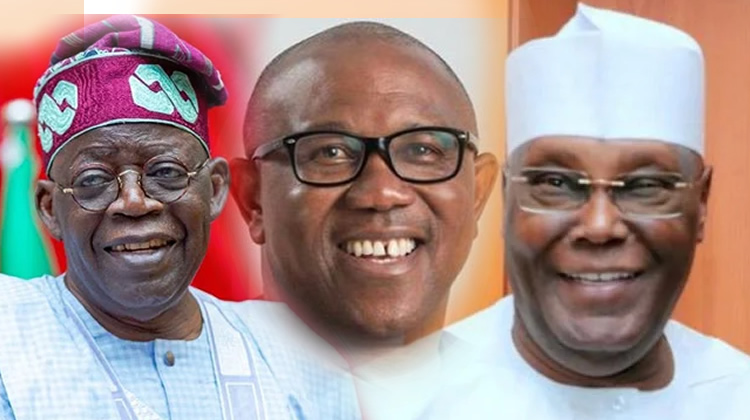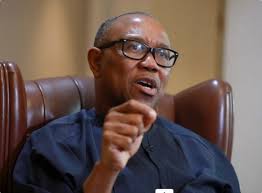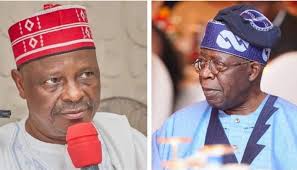
Tinubu Triumphs After 171-Day Battle
The Supreme Court, on Thursday, ended the 171-day legal tussle to nullify the election of President Bola Tinubu with the rejection of the election appeals filed by the Peoples Democratic Party standard bearer, Alhaji Atiku Abubakar and Peter Obi of the Labour Party.
Atiku and Obi’s appeals commenced on May 8 and were concluded on Thursday, October 26, with the Supreme Court effectively ending their dreams of overturning Tinubu’s election victory.
In the lead judgment delivered by the Chairman of the seven-man panel, Justice Inyang Okoro, the apex court refused to consider the academic records of the President obtained from the Chicago State University, which Atiku sought to tender as fresh evidence to prove his allegation of certificate forgery against the ex-Lagos State governor.
The other justices on the panel-Uwani Aji, Mohammed Garba, Ibrahim Saulawa, Adamu Jauro, Abubakar Tijjani, and Emmanuel Agim, agreed with the lead judgment dismissing Atiku and Obi’s appeals.
An elated Tinubu welcomed the Supreme Court verdict and sought the support of Nigerians, promising to exceed expectations in service delivery in the remaining years of his administration.
The President lauded the judiciary for withstanding “the fusillade of pressure and attempts at intimidation by some political actors.”
In a statement he signed, Tinubu said, “The victory of today has further energised and strengthened my commitment to continue to serve all Nigerians of all political persuasions, tribes, and faiths with honour and total respect for the diverse opinions and uniting values of our citizens.
“Our Renewed Hope Agenda for a greater and prosperous Nigeria has further gained momentum, and I will continue to work from morning to night, every single day, to build a country that meets our collective yearnings and aspirations. We are all members of one household, and this moment demands that we continue to work and build our country together.’’
In the lead-up to Thursday’s judgment, Atiku and Obi had faulted the September 6 ruling of the Presidential Election Petition Court.
The PEPC headed by Justice Haruna Tsammani had dismissed their petitions and upheld Tinubu’s electoral victory in the February 25 presidential poll.
Atiku had filed 35 grounds of appeal while Obi filed 51 at the Supreme Court.
To prove the allegation that Tinubu was not qualified to contest the presidential poll, Atiku had asked an Illinois Chicago district court to order the CSU to release the President’s academic records.
The former vice-president accused Tinubu of falsifying the CSU diploma of Bachelor of Science in Business Administration awarded in 1979 that he submitted to the Independent National Electoral Commission for the election.
He demanded a copy of any diploma issued by CSU in 1979, a copy of the diploma the CSU gave to Tinubu in 1979, and copies of diplomas with the same font, seal, signatures, and wording awarded to other students that are similar to what CSU awarded to him in 1979.
Atiku’s application was opposed by Tinubu’s lawyers, citing privacy concerns. Still, the United States court ordered the release of the ex-Lagos State governor’s academic records, which Atiku filed in support of his election petition appeal at the Supreme Court.
However, the hope of the former vice-president was dashed by the court, which held that the constitutionally allowed period for such evidence to be admitted had since elapsed.
It stressed that section 285(5) of the 1999 Constitution, as amended, expressly gave the PEPC a 180-day lifespan to hear and determine in writing, all petitions arising from the presidential election.
According to the apex court, considering that the PEPC, which sat as the court of first instance in the presidential dispute, had since delivered its verdict, no provision of the law would allow the admittance of any other evidence at the appeal stage.
Court rejects evidence
It noted that the 180 days given to the tribunal by the Constitution expired on September 17, adding that the Supreme Court no longer had the requisite jurisdiction to admit the document.
“This court cannot do what the trial court is no longer constitutionally permitted to do, “Justice Okoro held, adding that Atiku and the PDP could no longer invoke the provision of section 22 of the Supreme Court Act.
More so, the apex court noted that the forgery issue, which Atiku sought to establish through the proposed fresh evidence,was not pleaded in any paragraph of his appeal.
“It is crystal clear that the additional evidence did not fit into issues for determination in this appeal. Therefore, this application is refused and accordingly dismissed,” the Supreme Court held.
Citing sections 14(2a) and 132 of the Electoral Act, Okoro said a petitioner is not allowed to amend his petition after the stipulated 21 days, let alone provide fresh evidence.
He said, “A petitioner shall not be allowed to amend his petition after 21 days allowed by section 132. The appellants have not applied to the court to amend their petition flect the fact of forgery, and Exhibit C and D sought to be admitted.
“Facts and documents not pleaded in the petition have no place in deciding the dispute between the parties. I wonder how they want to use the evidence in this appeal.
“Also, let me refer you to the comment by Atiku’s lawyer. It is shocking to have Atiku’s lawyer argue in print that there is no statutory time limit of 180 days for the lower court to decide a presidential election petition. It could have passed for friendly jokes but not for a serious matter like this.”
He declared, “After election petitions have suffered as a result of the provision which allowed election petitions to be heard even until the respondent has completed his tenure, the National Assembly dealt with this mischief by limiting the time which election petition shall be determined.
“It is unfair to suggest we go back to the dark days. There is nothing in section 285(6) of the Constitution to suggest that the court of appeal can hear a presidential petition without time limitation.
“Since the lower court cannot entertain such an application, it follows that this Supreme Court also has no jurisdiction to allow the deposition to be used in this appeal. It has to be noted that the 180 days imposed to hear election petitions is immutable and cannot be extended.’’
“It is a settled law that the time fixed by the constitution for the doing of anything cannot be extended, it is immutable, and it is fixed like the rock of Gibraltar and it cannot be moved, expanded and elongated, or stretched beyond what it states,’’ he stated with finality.
Rejecting Atiku’s prayer for his application on the CSU deposition to be granted, the jurist noted, “The leave cannot be granted. We do not have the vires to admit this deposition. We cannot invoke section 22 of the Supreme Court Act since the lower court has lost its jurisdiction.
“There is no paragraph in the petition to accommodate a case of forgery. If the deposition should be admitted, it would float on the appeal. The appellant failed to convince this court why it waited till after the tribunal delivered its judgment in the petition and lost the 180 days donated to it by the constitution before bringing the deposition.
“It has to be noted that appeals are a continuation of the hearing of the matter in the lower court. With due respect to the appellant counsels, they were tardy and not diligent enough. The deposition does not fit into the determination of this appeal. It is hereby refused and dismissed.”
Furthermore, the court held that Atiku did not prove that the Independent National Electoral Commission did not substantially comply with the provisions of the Electoral Act, in the conduct of the election.
The apex court affirmed that section 185(1) of the Evidence Act provided that an election should not be liable to be invalidated when alleged non-compliance did not substantially affect the outcome of the election.
It further held that the evidence contained in the record of the appeal showed that the appellants abandoned the duty imposed on them by the law to not only prove the alleged non-compliance but to establish that the failure of INEC to transmit the results of the election through its IReV portal influenced the outcome of the presidential poll.
The Supreme Court said it had in past judgments made it clear that there was a difference between the election result collation system and the IReV portal.
Results collation
“Where the IReV portal fails, it does not stop the collation which up till the last election was manually done,” the court pointed out.
Nevertheless, it stressed that INEC’s failure to electronically transmit the results of the election denied the electorate the opportunity to follow and cross-check the results that were eventually uploaded.
“Truth must be told, the non-transmission of results to the IReV portal may also reduce the confidence of the voting population in the electoral process,” Okoro warned.
He emphasised that the unavailability of results on INEC’s IReV portal “for whatever reason, could not be the reason for an election to be nullified.’’
Ruling on the failure of INEC to transmit the result to IREV, Okoro said the non-transmission of the





